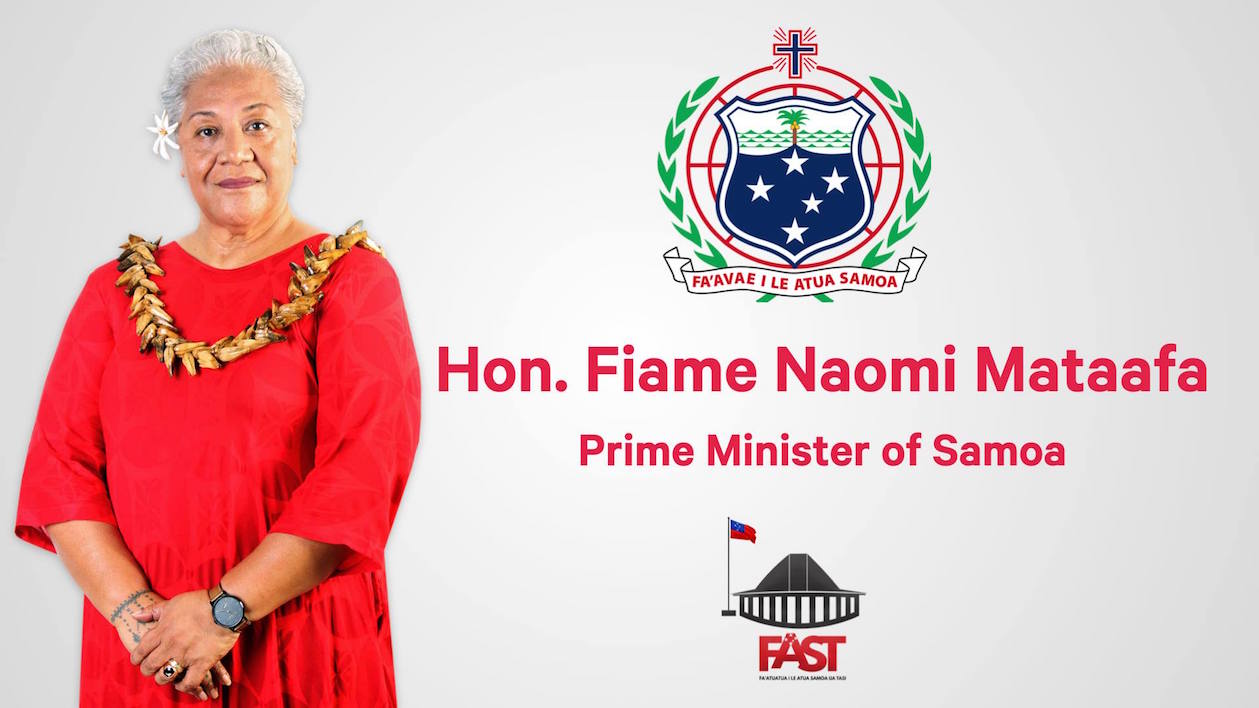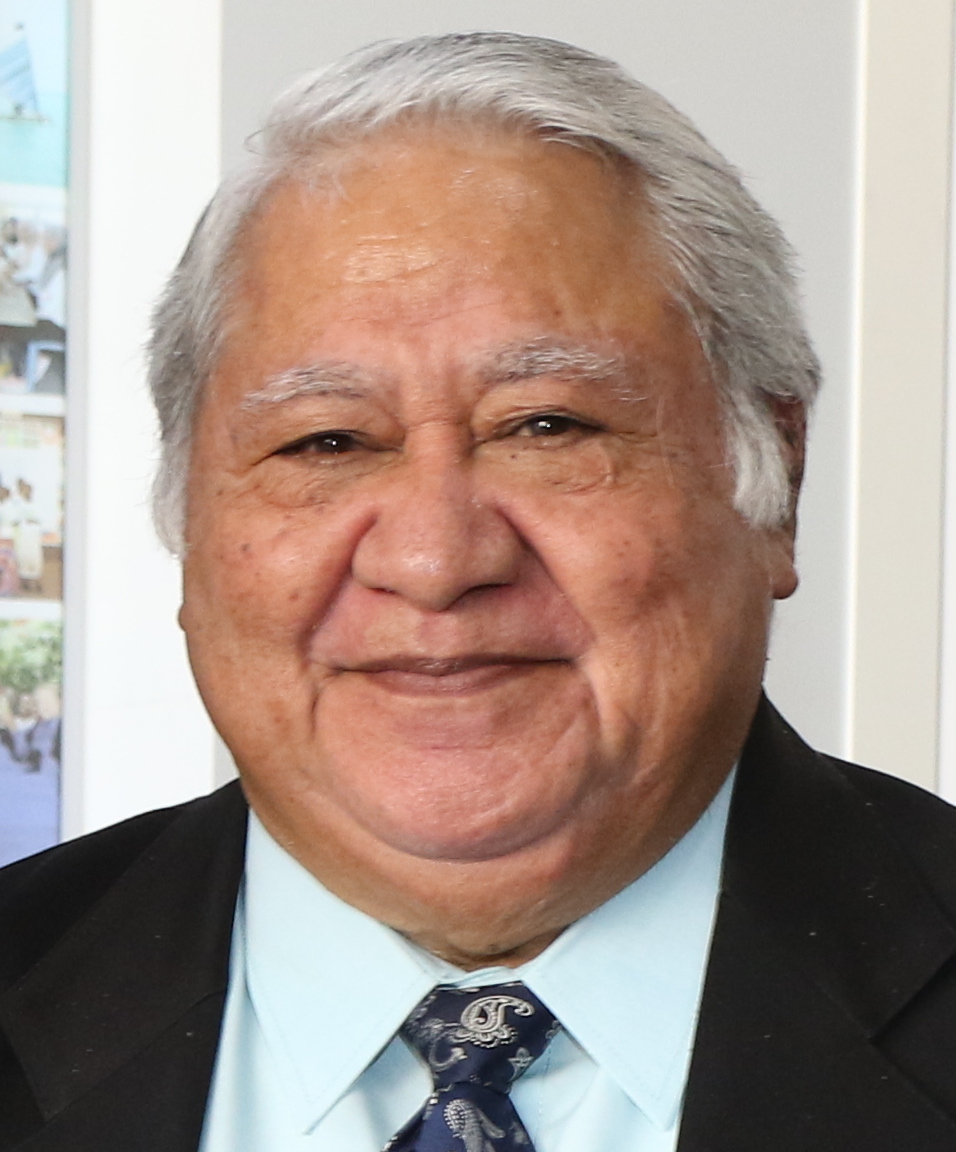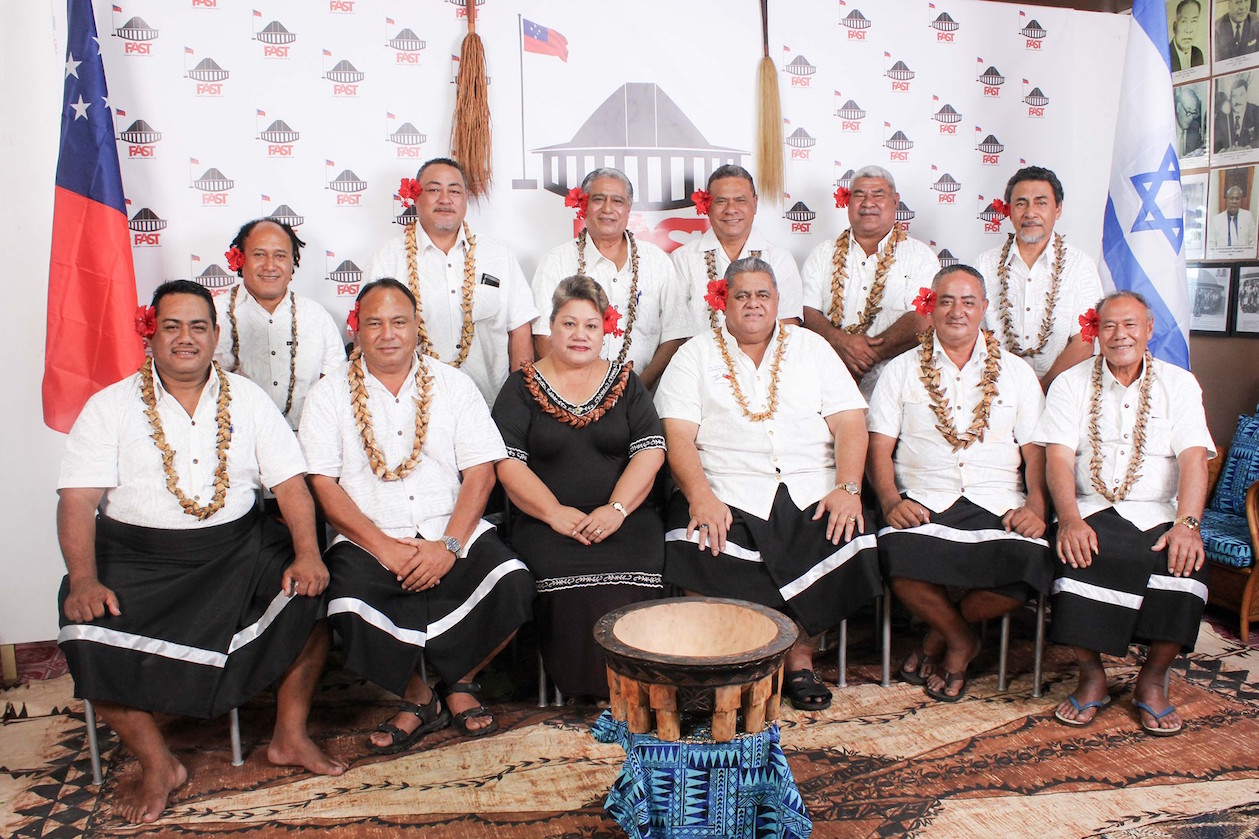by Nathan Schmidt
語言:
English
Photo Credit: FAST Party/Facebook
GENERATIONAL CHANGE is set to sweep the island nation of Samoa—if not for last-minute obstacles.
After more than four decades in power, the ruling Human Rights Protection Party (HRPP) neck-and-neck with its challenger, the newly-minted Faʻatuatua i le Atua Samoa ua Tasi (FAST) party, in a knife-edge contest for the future of Samoan democracy.
The results, which had both parties tied at 25 seats apiece, could not have been predicted a year ago. Hardly any Samoans would have doubted the HRPP’s grip on power. Fewer still would have guessed its challenger for prime minister would have been a woman.
 Fiame Naomi Mata’afa. Photo credit: FAST Party/Facebook
Fiame Naomi Mata’afa. Photo credit: FAST Party/Facebook
Fiame Naomi Mata’afa will be the first female leader in modern Samoan history and part of a small list of female leaders in the Pacific. Her breakneck campaign since joining the party only one month ago has been meteoric and driven by social media.
However, despite her win, Mata’afa found herself locked out of parliament earlier this week. This led Mata’afa to swear her oath in a tent on parliament grounds instead.
Late last year, Fiame broke from the HRPP and its long-time leader, Tuilaepa Sailele Malielegaoi. After more than 32 years as premier, Tuilaepa is one of the world’s longest serving leaders. Malielegaoi is currently refusing to relinquish power to Mata’afa.
And yet, in the last year he has seen his popularity plummet after his party passed a suite of controversial laws. While at the same time, the tourism-dependent economy was left battered by the COVID-19 pandemic.
Samoa-based lawyer Fiona Ey writes: “The bills bring about major constitutional changes that would undermine judicial independence and the rule of law, with significant implications for human rights.
“Critics have noted the long-term deconstruction of Samoan democracy via the gradual erosion of the constitution and government systems. This has seen the accumulation of power in the executive, and more particularly a dominated Cabinet,” says Fiona who’s husband is a Supreme Court judge.
“The judiciary is the final frontier.”
In March, Fiame joined FAST as its new leader after serving under Tuilaepa as deputy prime minister. The party’s name is an acronym of Fa’atuatua i le Atua Samoa ua Tasi, which translates to “Faith in the One True God”. From as early as July they stated their intention to contend the election and began to grow their support at home and overseas.
Mata’afa’s win its a story of David and Goliath, says Dr George Carter.
George is a research fellow at the Australian National University and a Samoan native. He goes by the honorific title of Sala, a type of chief, and says that the HRPP would have likely expected a comfortable return to power. In the last election in 2016, they received no less than 47 of the 51 available seats. But that was before the recent crisis and before the mass mobilization FAST has engendered.
“FAST have really utilized the power of social media,” George says.
“They utilize that network and the influence that the diaspora have on their families back home to create not just a base of voters in Samoa, but supporters internationally.”
The average age in Samoa is only 26. But that itself only represents a small percentage of Samoan people globally. More than two-thirds of Samoans live outside of Samoa. Half are in the United States, including its island territory of American Samoa. Another 75,755 are in Australia, as of the 2016 national census.
In previous elections, including the one in 2016, Samoans would return en masse to vote, according to George. Voting in Samoa can only be done in person. Which meant that with the current restrictions on travel because of the COVID-19 pandemic, many Samoans found themselves unable to cast their ballot.
This was particularly true in Australia where for the last 13 months Australian citizens have been under an almost complete border lockdown. Permission to leave has to be sought from the government. Return was almost impossible. For many in the diaspora, Australia was a safer bet than Samoa, with strong social welfare, a largely resilient economy and consistently low COVID activity.
That doesn’t mean Samoan-Australians or Samoan nationals residing in their island neighbor were not politically active. Quite the opposite was true. Ordinary Samoans in the diaspora agitated for change.
Among them is Ali’i Jerry Ukele.
Jerry has lived in Australia for more than 20 years and also goes by the chiefly title Ali’i. At 52, unlike many Samoans, Jerry knew of a Samoa before the HRPP. Along with many other younger Samoans residing in Sydney, Australia where he works with the Sydney Samoan Community, he was heavily involved through social media in the election campaign while not being able to vote himself. He even thanks the services for the meteoric rise of FAST.
“It has been one of the most unique elections,” he says.
“Social media is free. There’s no one turning it off. Everyone had access to it. And in that period of eight months (since the founding of FAST), more than half of the voting population back home in Samoa changed their mind. They understood, they started questioning what is happening and what has happened over the years.”
Samoan media, Jerry says, is controlled by the government, raising the importance of social media.
“[Government media] don’t allow the opposition to come on these media to have a healthy live debate. Never. So on Facebook, there were campaigns for the opposition party worldwide.”
Jerry says the diaspora community calls FAST “the saviors of democracy”, because: “With a one state party everything is passed through a unanimous vote so whether you are asleep or dreaming on your phone in Parliament, he just says ‘yes’, because that’s how bad it was.
“The land bills were the turning point in which the government for the first time in our history will be in control of monitoring village and family chiefs that control the districts. So behind all that is the land grab.
“People over the years have woken up and thank you to social media,” he says.
At the heart of the campaign, Jerry says is, of course, Fiame herself.
Fiame’s family are part of the tama-a-‘aiga, Samoa’s royal lineage. Her grandfather helped draft Samoa’s constitution and her father was the island nation’s first prime minister after it gained its independence from New Zealand in 1962.
 Tuilaepa Aiono Sailele Malielegaoi. Photo credit: Foreign and Commonwealth Office
Tuilaepa Aiono Sailele Malielegaoi. Photo credit: Foreign and Commonwealth Office
In 1991, she became Samoa’s first female cabinet minister and held several portfolios including education, women, social development, justice and the environment. And in 2016, she became the island’s first female deputy prime minister. She has come to demand international acclaim in her fight for women’s rights.
Jerry likens Fiame to an historical god-figure known as Nafanua. According to Samoan mythology, she was daughter to the Ali’i, or chief, of Pulotu, the heaven-like resting place for the deceased in the Tongan and Samoan mythos. She also took part in the civil wars across Sava’i, the main island in Samoa. And on her death was rendered a god-like form.
She also, as Jerry points out, foretold the advent of Christianity in deeply religious Samoa.
“We remember her for that,” he laughs.
“[Fiame is] compared to that war goddess. We can’t wait for the official crowning of her to be the first female prime minister of Samoa.”
A community fundraising campaign in March among the Samoan diaspora in Australia raised more than $AU133,000, Jerry says. While the American diaspora raised another $1 million.
“Individual families whose members and district members ran for the election, they all contributed. They sent money overseas to fund their campaigns,” as well as their travel and election paraphernalia, including posters, banners, logos, t-shirts, and hats.
The phenomena, George says, isn’t new.
“This is something we’re seeing for the first time in Samoa but it’s something that’s also very common in diasporic communities in Latin America. You see it in the Philippines, too.
“[In countries] with big populations overseas outside of the country, [the diaspora] can become very influential or have a strong voice.”
Not just official party pages, but also smaller Facebook pages, Twitter accounts, including the sort run by Jerry and his community, George says really captured the conversation and created a narrative.
“Various different narratives that have been not just anti-government, but very much to the personality of the person in charge of the country, they’ve created a mass following, which has led them to lead voters to come to them during the April 9 elections.”
In fact, the majority of Samoan people in the diaspora have thrown their support behind the FAST party, based on a variety of factors, says George. Firstly there is the issue of transparency. One of FAST’s platforms has been the decentralization of decision making in the capital. FAST has put forward the right for Samoans overseas to be able to vote. Although, they have not promised the reform will take place should they take power.
“This time around there are these big campaign donations from overseas flowing through to support FAST’s party base. But, at the same time, the strategies from the ruling party have sort of remained as they have been, which is trying to submit to their base by working inside the communities. Focusing the campaigns around the community and families within the constituencies.”
“But that has not necessarily worked in half of the constituencies that have voted,” George says. But, that’s not to say that the HRPP aren’t using social media. They just aren’t doing it as well, he adds.
“The ruling party is using [social media], but [it’s] not as effective as FAST. What we also see in the research that we’re trying to collate at the moment is that very young users have also created these sort of FAST pages.
“They’re not very professional companies. These young, social media savvy people and they’ve just created sort of a social media storm, and voters have picked up on them.
“With social media –with algorithms– if that’s the main information that you’re receiving through your Facebook or through your Tik-Tok accounts, of course that’s what will be influencing your decisions.”
A lot of the questions George is trying to answer now in his capacity as an academic centre around whether FAST’s social media success was part of a planned policy.
“What we’re trying to unpack at the moment is ‘was it a big overall strategy?’ At the moment, we’re still trying to finalize that answer, but it’s half-half. There was a social media strategy, but also there was also an added layer of adventurism.
“The story of change speaks louder than the campaign of ‘our work speaks for itself.’
“And, the story of change is very profound in that it can be picked up in social media. The power that you can change government or bring about change is something that was a successful tactic used by FAST.”
The new political dynamics at play in Samoa will also put a new, added pressure on FAST should they receive the premiership. They have been bankrolled by the foreign diaspora. They hold many of the purse strings. And their expectations are high.
“[FAST] have to be wary of what the diaspora demands of this government,” George says.
The diaspora may be apt to demanding greater accountability and something to show for their effort and investment. Firstly, George says, FAST will be looking to redress the controversial land bills which was such a major sticking point for voters and the diaspora.
“But because of how the opposition and government are in numbers, I don’t foresee drastic changes because any big changes or changes that will be proposed by FAST will be shut down by HRPP,” he says.
After all, it was the HRPP that actually scored the popular vote with about 60 per cent of voters in Samoa voting for the long-time leaders.
 FAST members. Photo credit: FAST Party/Facebook
FAST members. Photo credit: FAST Party/Facebook
There may be many weeks and months of political jockeying ahead before a final winner is determined. But, for most Samoans, they mightn’t be looking for social revolution. They’re just looking for stability.
“At the end of the day for ordinary Samoan it’s going to be another prime minister. There is pride to have a female prime minister, but I think what most people will be looking at is if they’re a competent leader,” he says.
“In times such as COVID, that’s what would be weighing very heavily on a lot of people. Yes, we can have a male or female leader but [the bigger questions are] around stability and how the tourism-dependent economy will bounce back.
“That, I think, will be the bigger question that will come after the current situation that’s going on at the moment. Because we still don’t know what will happen. This is the first time that the country is in limbo in 40 years, not having a clear cut winner at the end of elections.”

